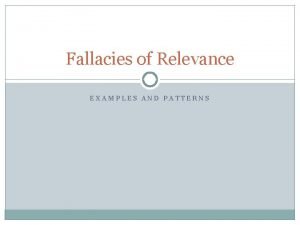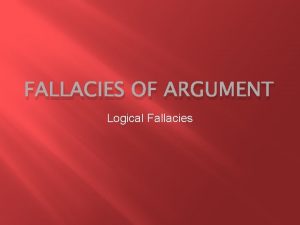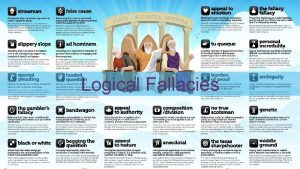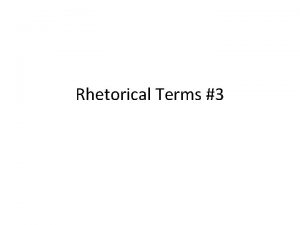Argument Fallacies Moment of Prayer Ad Hominem Attacking







- Slides: 7

Argument Fallacies Moment of Prayer

Ad Hominem • “Attacking the Person” • A persuasion strategy in which the person attempts to defend his/her own position by pointing out the undesirable associations, personal characteristics, or motives of those who do not accept it. • The impact of the suggestion that "only bad people disagree with me" is often supplemented with an "all good people agree with me", introducing an appeal to diffuse authority. The big (and overlooked) question is, what has their badness or your goodness got to do with the truth of your position? The big (and overlooked) answer typically is "Nothing. "

Argumentum Ad Baculum • “Appeal to Force” • An argument strategy used to reduce the critical impulses of the propositional consumer by demonstrating or implying that it could dangerous to disagree with the opposing side’s statements • Telling Mc. Fnerk "believe me or I’ll hurt you" rarely makes a believer out of Mc. Fnerk. However, hurting Mc. Fnerk when he refuses to believe you can make a believer out of people who see you do this, since humans have a perverse tendency to worship power. In any event, as critical impulses (if not critics) die out, your arguments have an easier time gaining acceptance.

Ad Misericordiam • “Appeal to Pity” • Seeking to support a statement by stating or suggesting that some person or creature the consumer cares about (maybe even the arguer) would be hurt or harmed by the consumer's not accepting the truth of the arguer’s proposition. • Note that we're talking about statements and believing them, not actions and performing them. That your action would result in harm to loved ones is a good reason for not doing it. But that your hardshell fundamentalist grandmother would fall right out of her combat boots if she heard you had accepted theory of evolution is not a good reason for you to decide that theory is not true.

Appeal to Authority • Defending a claim C by citing, as a premise, the fact someone E says or thinks C, where E's expertise (if any) is not relevant to the issue at hand, even though E may be someone who is famous or admired. • It's not necessarily fallacious, or irrational, to appeal to the judgment of authorities in support of a given statement. It is seriously irrational, however, to base your acceptance of a statement on the word of someone who doesn't know what they're talking about. For the many further requirements of a rational appeal to authority, refer to our analysis of Testimonial Arguments.

Argumentum Ad Homily • “Appeal to the Cliché” • A presentation which attempts to justify or explain some particular action or situation (e. g. losing this football game) by reference to some popular generalization about the way of all things, or the nature of the universe (e. g. "You can't win `em all. ") • Ironically, to traffic in such phrases as "That's how the cookie crumbles, " is commonly called being philosophical! Behind the ad populum appeal of the generalization, careful analysis usually discloses a false dichotomy, a slippery slope, or a fallacy of division.

Tautology • Broadly speaking, a tautology is any statement whose truth- value is True regardless of the truth-value any other statements may happen to have-- in other words, it's true in all possible situations. • There are no mountains over 15, 000 feet high, or there is at least one such mountain.













